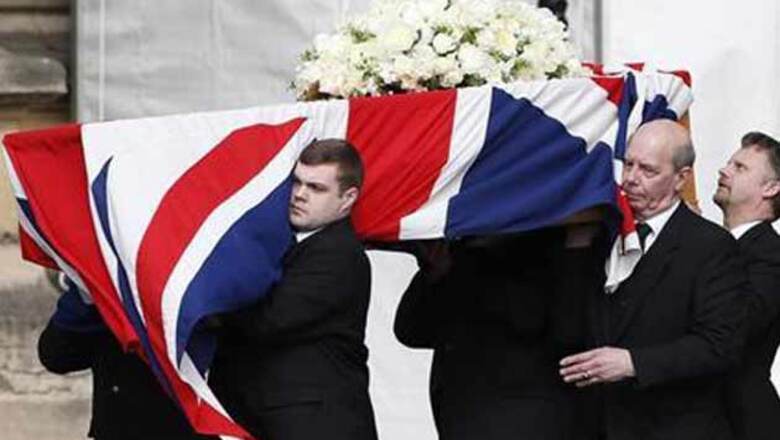
views
London: London will stage its biggest political funeral in almost half a century on Wednesday when Britain's governing elite join the Queen and global leaders to bid farewell to former Prime Minister Margaret Thatcher, better known as the "Iron Lady".
In an event comparable to that of Winston Churchill's funeral in 1965, Thatcher's coffin will be carried atop a horse-drawn gun carriage through streets lined with admirers, and some detractors, from parliament to the city's most famous cathedral.
The bells of London's iconic Big Ben clock tower will fall silent for the first time since Churchill's funeral and more than 700 men and women from Britain's armed forces will honour a woman who led them to victory in the 1982 Falklands War as foreign dignataries from around 170 nations look on.
Thatcher, who ruled Britain from 1979 to 1990, died on April 8, 2013 after suffering a stroke.
In life, the woman the Soviets christened the "Iron Lady" divided the British public with her free-market policies which sometimes wrought wrenching change on communities. In death it is no different.
Polls have shown that many are unhappy that the estimated 10-million pound bill for the funeral is being picked up by the taxpayer, while some left-wing lawmakers say the pomp-filled funeral is excessive and amounts to a party political advert for her ruling Conservative party.
But her admirers, of which there are many in her party and in southern England, argue that her historical profile merits such a funeral. She was the country's first and only woman premier, was Britain's longest-serving prime minister of the 20th century, and won three general elections.
More than 2,300 mourners will attend including 11 serving prime ministers from around the world, the British government's entire cabinet, two heads of state and 17 foreign ministers.
But there will be notable absences. Former Soviet leader Mikhail Gorbachev is too frail to attend and Nancy Reagan, the widow of Thatcher's great US ally Ronald Reagan, is also unable to come.
Thatcher struck up a close relationship with Reagan during the Cold War, backed the first President George Bush during the 1991 Gulf War, and was among the first to discover that Gorbachev was a man she could "do business with".
Draped in the red, white and blue British flag, Thatcher's coffin lay overnight in a 13th-century chapel in Britain's parliament, a forum she dominated for years.
The guest list for her funeral has prompted talk of diplomatic snubbing.
On Tuesday, a spokesman for Cameron denied the United States had snubbed Britain by not sending anyone senior from the administration of President Barack Obama.
"Absolutely not," the spokesman said.
Obama is sending George Shultz, a secretary of state for Republican President Ronald Reagan, and James Baker, who had a number of senior roles in both the Reagan and George HW Bush presidencies. No senior serving politicians are attending.
The spokesman also said the Argentine ambassador had refused an invitation to attend, a decision coloured by worsening diplomatic tensions over the contested Falkland Islands.
Relations between the two countries remain strained after a 1982 war over the islands during which Thatcher ordered a task force to retake the contested South Atlantic archipelago after Argentine troops seized it by force.
'I VOW TO THEE MY COUNTRY'
The funeral will be covered live by Britain's biggest broadcasters. Mourners will hear her favourite hymns including the well-known early 20th century celebration of British patriotism "I vow to thee my country" and bid her farewell.
St Paul's, the 300-year-old cathedral where her funeral will take place, played host to the funerals of Nelson, the Duke of Wellington and Churchill as well as to the wedding of Prince Charles and Lady Diana Spencer. It also withstood two bomb strikes during the World War Two.
The abiding domestic images of her premiership will remain those of conflict: huge police confrontations with mass ranks of coalminers whose year-long strike failed to save their pits and communities; Thatcher riding a tank in a white headscarf; and flames rising above Trafalgar Square in the riots over the deeply unpopular "poll tax" which contributed to her downfall.
But even her critics concede that - for better or for ill - she transformed the face of Britain.
In 1979, when she came to power, Britain was in the grip of a long post-war decline with notoriously troubled labour relations, low productivity and was being outperformed by continental rivals France and Germany.
Data show she turned that around by boosting home ownership and the service industry, breaking the power of Britain's trade unions, and deregulating financial services.
But the price - growing inequality and the closure of large swathes of the country's industrial base - left parts of the country struggling to create new jobs and rebuild decimated communities, leaving a bitter taste which endures.
Some of her most extreme opponents have "celebrated" her passing, holding a poorly-attended "party" in central London on April 13. Cameron, who has found comparisons to Thatcher uncomfortable, has denounced such events as "distasteful".




















Comments
0 comment